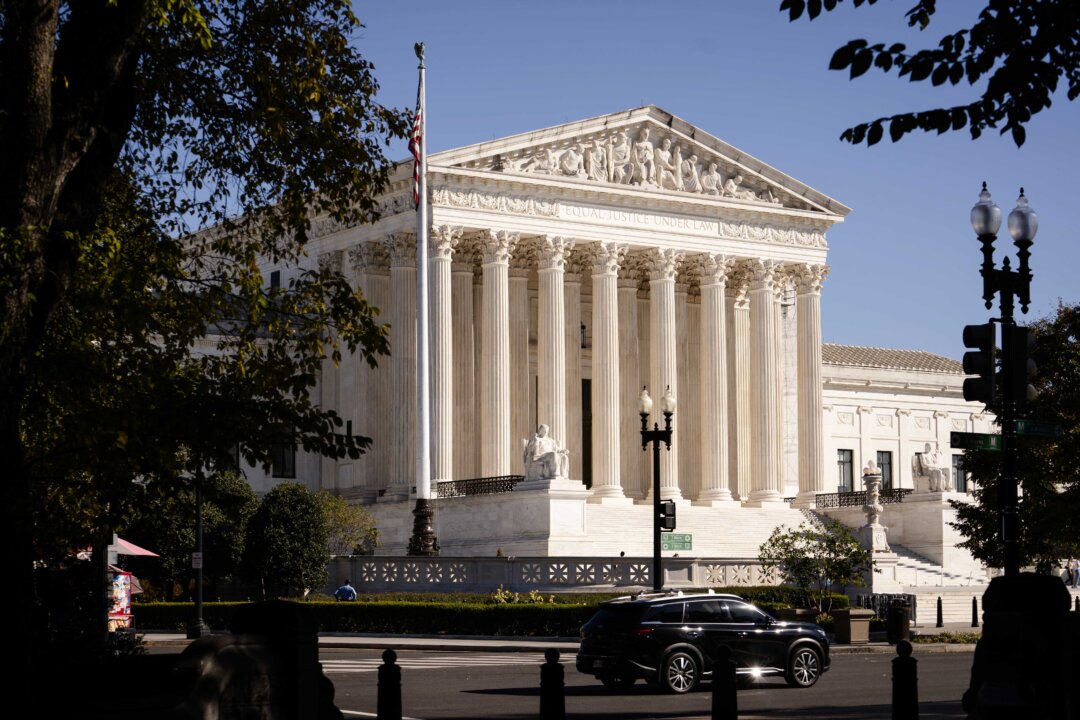The Pennsylvania Supreme Court previously ruled that voters can submit provisional ballots after improperly submitting mail-in ballots.
The U.S. Supreme Court on Nov. 1 rejected Republicans’ request to halt the effects of a state court’s decision allowing Pennsylvania voters to cast provisional ballots after they have improperly submitted mail-in ballots.
Justice Samuel Alito issued a statement, which was joined by Justices Neil Gorsuch and Clarence Thomas, saying that even if they agreed with Republicans’ arguments, “we could not prevent the consequences they fear.”
He said that staying the lower court’s judgment “would not impose any binding obligation on any of the Pennsylvania officials who are responsible for the conduct of this year’s election.”
It’s unclear whether any justices voted to approve Republicans’ request for relief.
The decision took place less than a week before Pennsylvania voters head to the polls for the Nov. 5 elections.
Republicans asked the U.S. Supreme Court to take up the Pennsylvania Supreme Court’s ruling, stating that it was “so unreasonable that it violates the Elections and Electors Clauses of the U.S. Constitution.”
Republicans told Alito that the state court had issued its decision too close to the election, violating a legal principle against last-minute changes to election procedures known as the Purcell Principle, established by a case from 2006.
They told Alito that a stay would restore the status quo and “would not cause any voter confusion or chaos or application of new rules. It would simply require election officials to apply the exact same rules for processing provisional ballots that governed before that decision.”
At the very least, the Republican National Committee (RNC) argued, the justices should segregate provisional ballots received from individuals with defective mail-in ballots.
Alito said in a Nov. 1 statement that the highest court is unable to order a separation of ballots.
“[B]ecause the only state election officials who are parties in this case are the members of the board of elections in one small county, we cannot order other election boards to sequester affected ballots,” he wrote.
Democrats, the commonwealth, and county officials filed amicus briefs on Oct. 30 urging the Supreme Court not to grant Republicans’ request.
In its brief, the Pennsylvania Democratic Party alleged that Republicans faced several procedural hurdles to bring their claims before the U.S. Supreme Court and that the state supreme court’s ruling was a straightforward interpretation of state law.
“It is miles away from the type of extreme departure from the norms of judicial decision-making that could implicate Electors or Elections Clause concerns,” their brief stated. Arguments about those clauses, the party also said, had been waived in the state court system.
Two briefs from Pennsylvania state and county officials argued that concerns about timing should weigh in favor of rejecting the Republican request.
“The Pennsylvania Supreme Court’s affirmance maintained the status quo and ensured uniformity across all counties. It is the entry of a stay, on the eve of the election, that would cause maximum disruption and confusion,” the brief from the Commonwealth of Pennsylvania and Pennsylvania Department of State read.
The county officials said that “granting the relief sought would require significant and immediate changes, stripping voters and county election officials of an important failsafe, just days before the election.”
“It would lead to voters making futile attempts to cast provisional ballots on Election Day and impose burdens on election staff in addressing this Court’s intervention,” they said.
The case centers on a provision of state law that says a “provisional ballot shall not be counted if [a voter’s] absentee ballot or mail-in ballot is timely received by a county board of elections.”
The lawsuit came from two voters in Butler County, Pennsylvania, who submitted mail-in ballots in the 2024 primary election where their ballots were not enclosed in secondary “secrecy envelopes” inside outer envelopes containing their voting date and voter information, as required under state law, prompting the state’s automated early detection system to notify them that their ballots likely wouldn’t be accepted for counting during canvassing.
They later cast provisional ballots but were similarly told by county election officials that those wouldn’t be counted either, according to court documents. Director of elections for the Butler County Board of Elections, Chantell McCurdy, said that while missing signatures may be cured, no curing procedure exists for naked ballots.
Procedures for curing defective ballots in Pennsylvania differ from county to county. The Pennsylvania Supreme Court in 2020 ruled that courts are not allowed to mandate that counties cure ballots.
However, in its latest ruling, the state court said that provisional ballots were authorized by law as a distinct pathway from ballot curing.
The RNC, which intervened during the lawsuit brought against Butler County, said that in their interpretation, state law plainly prevents a voters’ provisional ballot from being counted if the county receives their mail-in ballot in time, including situations where a ballot is improperly submitted without the secrecy envelope.
In a 4–3 decision, the Pennsylvania Supreme Court disagreed and said that naked ballots were “void” and therefore not cast, making their electors eligible to have a provisional ballot counted.

